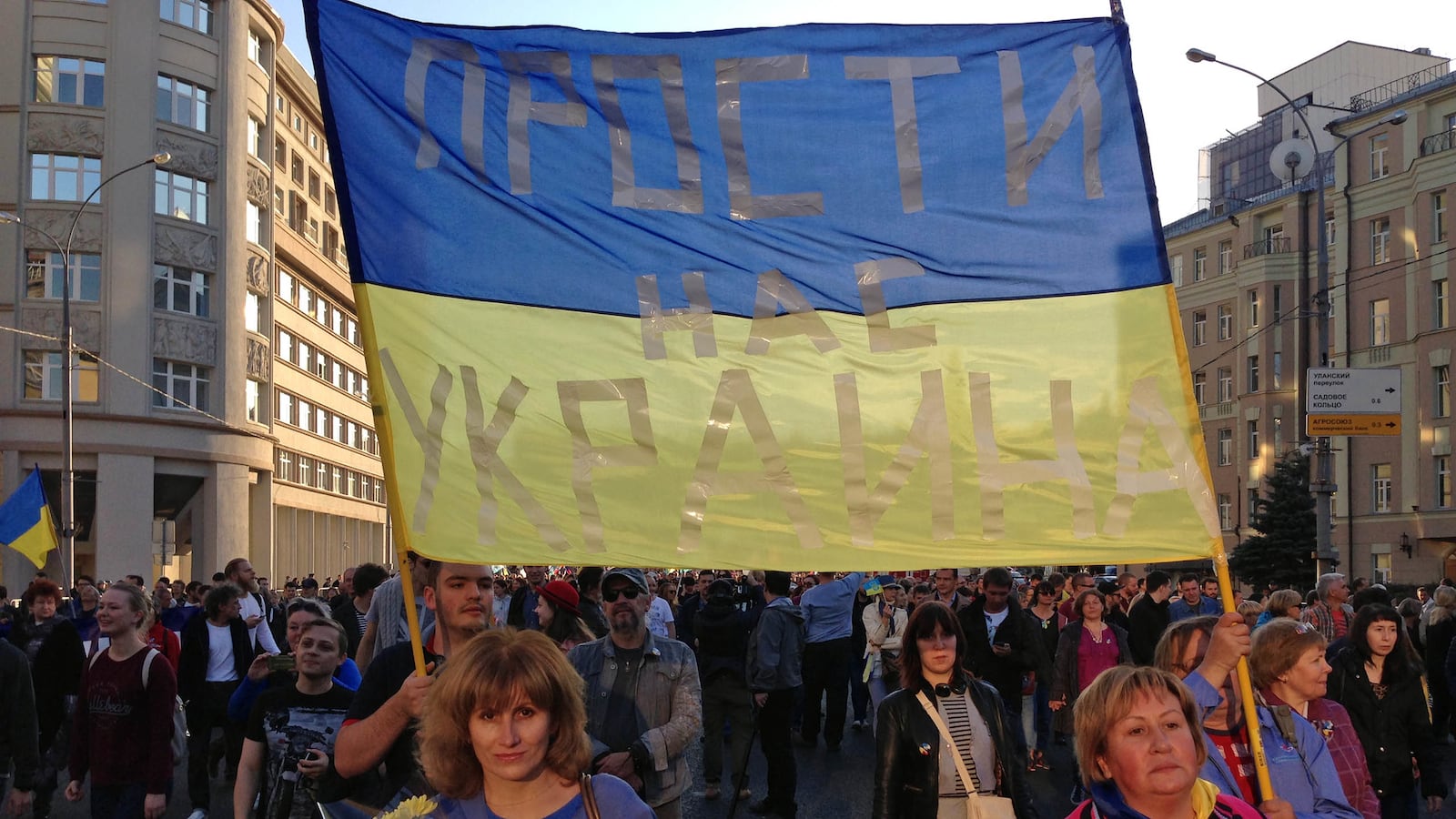MOSCOW, Russia — Autumn sun shone through a huge blue and yellow flag stretched above the heads of marching protestors with three words written over it: “Forgive us, Ukraine!”
Thousands of people had poured into the streets of the Russian capital on Sunday, many of them in the colors of independent Ukraine, some carrying bouquets of flowers to match. In a country where the government has been sounding the drums of war for many months, the Peace March was the day when these thousands managed to win over the fear that they’d be fired by a pro-Kremlin employer, beaten by a police club, or put behind bars.
There was a genuine sense—perhaps deceptive, perhaps wishful thinking, or perhaps the beginning of a sea change in Russian attitudes—that the Ukraine war might be stopped and the reign of President Vladimir Putin brought to an end.
Not only was it a most unusually warm, almost summery day, many protesters brightened when they heard the news, coinciding with the march, that former political prisoner Mikhail Khodorkovsky has announced his readiness to reenter Russian politics and reform the country. The erstwhile billionaire’s decision gave many in dissident circles hope: the notion that there’s a change they can look forward to, however unlikely.
“This is a historic day—today we believe that Putin will have to step down soon. Khodorkovsky will be the future president of Russia, I have no doubts,” one of the protesters, a young designer, Galina Surikova, told The Daily Beast. “I was disappointed when he flew away abroad as soon as he came out of jail last winter, but now I realize he needed time to grow stronger and put his program together.” Many Russians, of course, remain deeply skeptical about the former oil tycoon, his ability to effect change, and his real intentions.
On Sunday afternoon, about 20,000 Russians marched on the Moscow boulevards, along the route that had become traditional during anti-Putin protests in 2011 and 2012. Activists of several opposition parties and individual protesters formed their columns at 4 p.m. in Pushkin Square to make it to Sakharov Prospect by 6 p.m. Moscow City Hall had made them wait many weeks for this moment, and it permitted only two hours for the protest. But that was good enough. Earlier, even individual protesters demonstrating against the war were arrested.
On their social media page the Peace March organizers called for a “stop to the propagandist hysterics” on the state television channel and for an end to the gas and trade war against Ukraine. Famous public figures including the award-winning environmentalist Yevgeniya Chirikova and a senior human rights defender, Lyudmila Alekseyeva, signed the opposition’s statement.
Russian authorities accused the opposition of betraying their country. “Let the organizers go to that protest in Kiev,” said Sergei Ordzhonikidze, a member of the Civic Chamber that reviews legislation. The head of Russia’s paratroopers union, Pavel Popovsky accused the organizers of “fulfilling the orders of Russia’s enemy” and working in the interests of United States of America.
Russian and Ukrainian flags waved together in the hands of the demonstrators. Passing by rows of policemen, protesters chanted: “If there is no Putin, there is no war” and “Ukraine is our friend!” In response they could hear a few hecklers shouting from behind the backs of policeman: “You who want the Maidan, will go to Magadan!” with a hint that anybody who attempted to call for a revolution in Russia would be sent to this city, famous for its Gulag. But their voices were muted by hundreds of anti-war slogans.
The majority of Russians admit they fear the police. A survey conducted by Echo of Moscow radio station showed that 84 percent of the radio’s listeners did not trust the police and admitted they were afraid of state law enforcement. How was it possible that in a country where the majority do not trust the police, the approval rating of President Putin skyrocketed to 86 percent earlier this year?
“Public opinion numbers change overnight in Russia,” parliament member Dmitry Gudkov told The Daily Beast while marching in the crowd of protesters on Sunday. “We have a good example: A month before he was sacked, Moscow Mayor Yuri Luzhkov also had approval ratings over 60 percent, but not many remembered him a few months after he was dismissed.”
Gudkov said that the Peace March was the turning point for Putin’s opposition, demonstrating that people “have stopped being frightened of Putin.”
“Look around,” he said. “Russians will not allow the war.”






